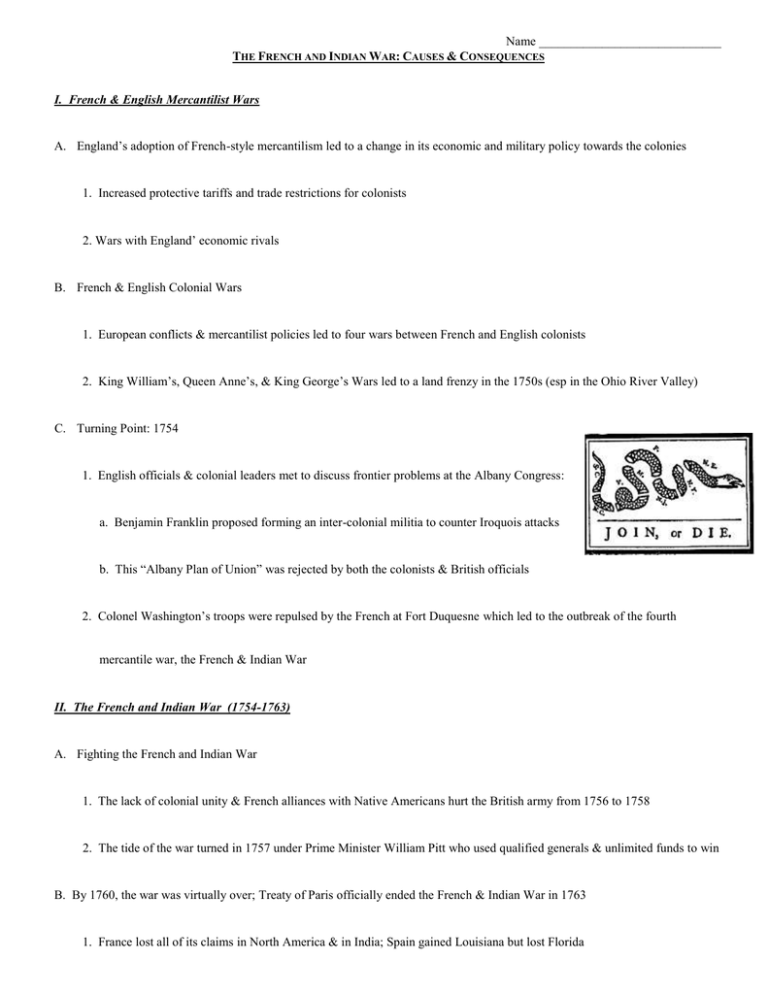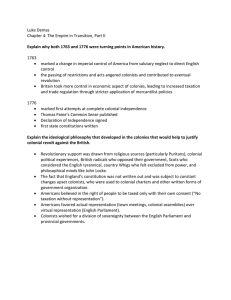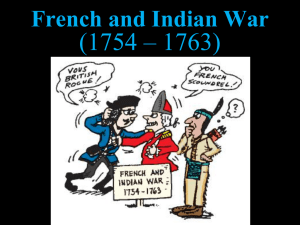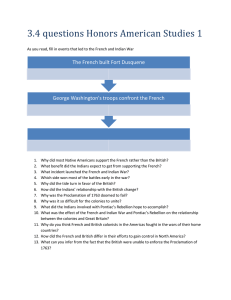Name _____________________________ T
advertisement

Name _____________________________ THE FRENCH AND INDIAN WAR: CAUSES & CONSEQUENCES I. French & English Mercantilist Wars A. England’s adoption of French-style mercantilism led to a change in its economic and military policy towards the colonies 1. Increased protective tariffs and trade restrictions for colonists 2. Wars with England’ economic rivals B. French & English Colonial Wars 1. European conflicts & mercantilist policies led to four wars between French and English colonists 2. King William’s, Queen Anne’s, & King George’s Wars led to a land frenzy in the 1750s (esp in the Ohio River Valley) C. Turning Point: 1754 1. English officials & colonial leaders met to discuss frontier problems at the Albany Congress: a. Benjamin Franklin proposed forming an inter-colonial militia to counter Iroquois attacks b. This “Albany Plan of Union” was rejected by both the colonists & British officials 2. Colonel Washington’s troops were repulsed by the French at Fort Duquesne which led to the outbreak of the fourth mercantile war, the French & Indian War II. The French and Indian War (1754-1763) A. Fighting the French and Indian War 1. The lack of colonial unity & French alliances with Native Americans hurt the British army from 1756 to 1758 2. The tide of the war turned in 1757 under Prime Minister William Pitt who used qualified generals & unlimited funds to win B. By 1760, the war was virtually over; Treaty of Paris officially ended the French & Indian War in 1763 1. France lost all of its claims in North America & in India; Spain gained Louisiana but lost Florida 2. England gained Canada, the Caribbean slave trade, and control of India C. Was 1763 a turning point in American history? Perceptions of War 1. Colonial Views: Glad to gain new land in western frontier & learned how to fight 2. English Views: Americans were not willing to fight or help fund a war to protect themselves D. The impact of the French and Indian War 1. Impact on Britain: the war increased England’s empire & its debt; led to a reorganization of America 2. Impact on colonists: post-war affluence & ties to English culture gave few any thoughts of independence III. Eroding the Bonds of Empire A. George III’s ascension brought “Parliamentary sovereignty”: Parliament has ultimate control over the colonies 1. “No Taxation Without Representation” led to debate over colonial assemblies vs. “virtual representation” 2. The Royal Army was not removed after the Seven Years War: expensive & was ineffective against natives B. Pontiac’s War (1763) of Ottawa Indians against western settlers along the Great Lakes 1. Attack revealed British weaknesses and Native American dissatisfaction with English treaties 2. The Paxton Boys in Pennsylvania took matters into their own hands against Indians 3. The British issued the Proclamation Line of 1763 to keep settlers out of Indian lands; Colonists resented this restriction C. English Parliamentary sovereignty contradicted salutary neglect & took place amidst the Enlightenment IV. Conclusions: Rule Britannia? Despite tensions, few colonists had ideas of independence by 1763







